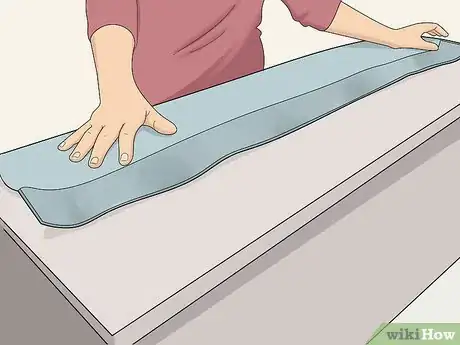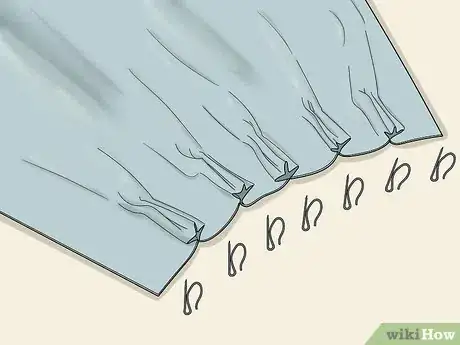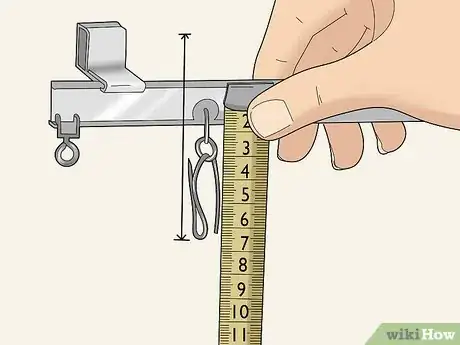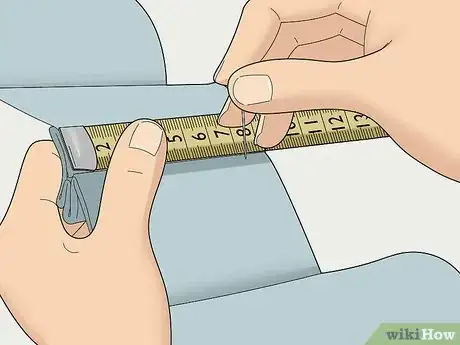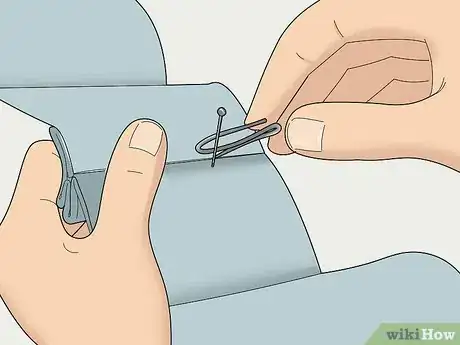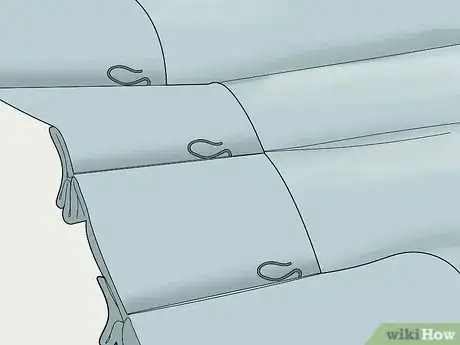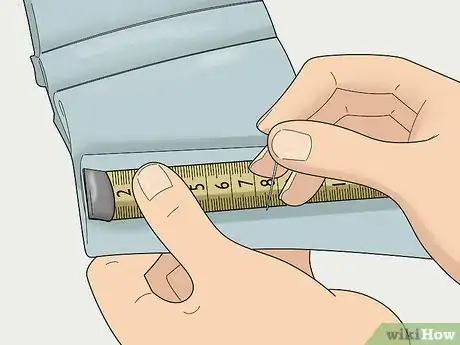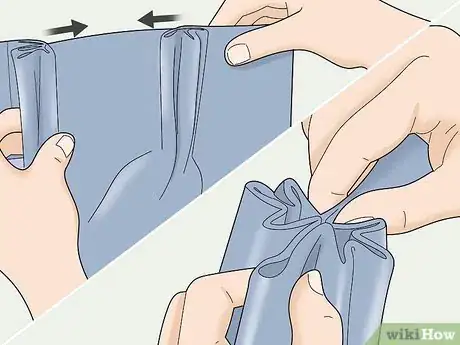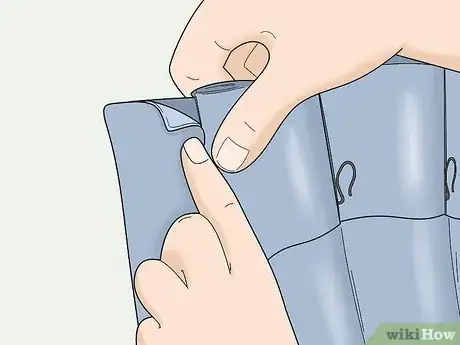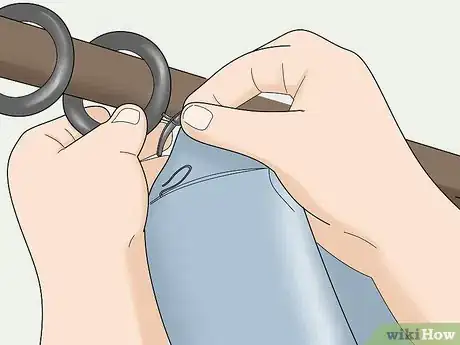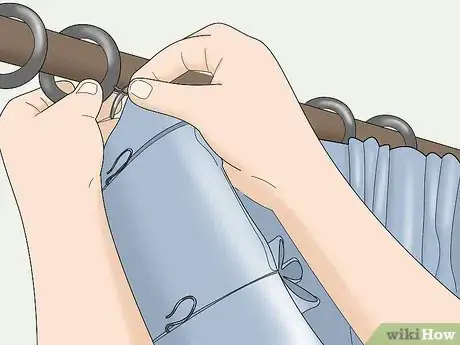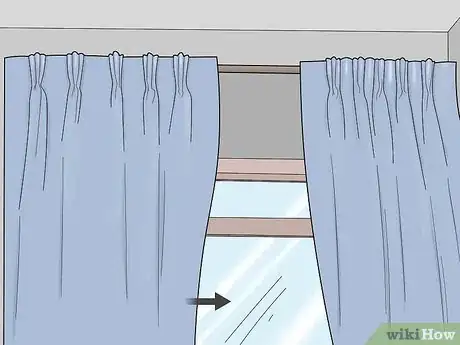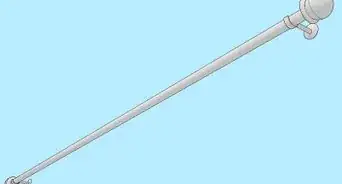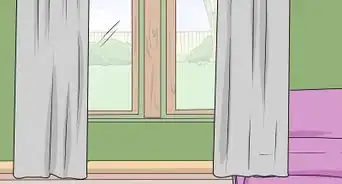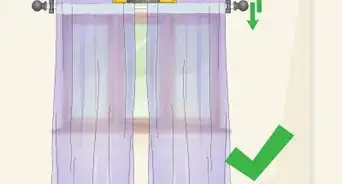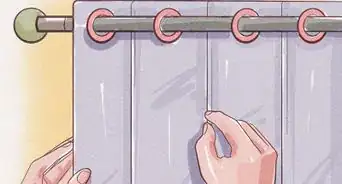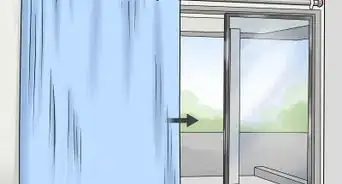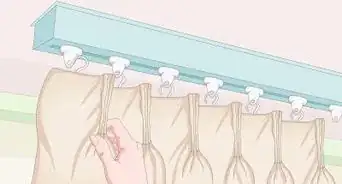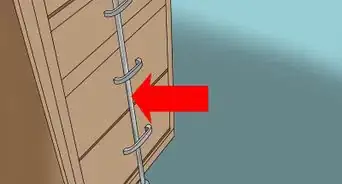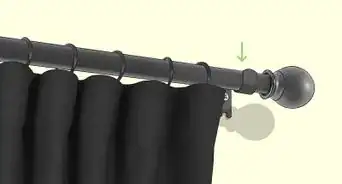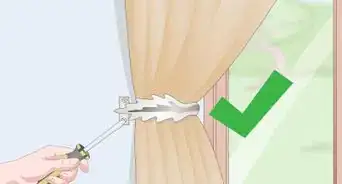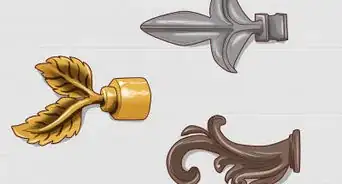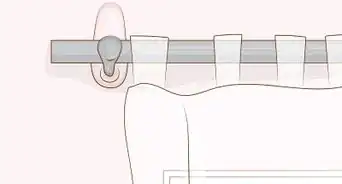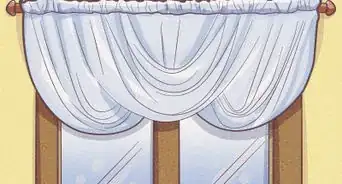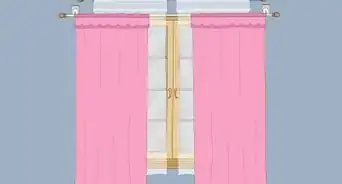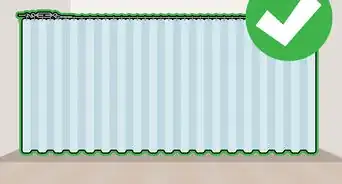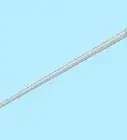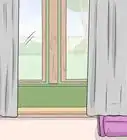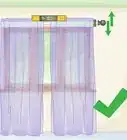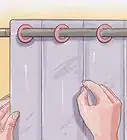This article was co-authored by Garrison Hullinger. Garrison Hullinger is an Interior Designer and the President of Garrison Hullinger Interior Design (GHID). With more than 15 years of experience, he specializes in client-centered design that balances beauty and warmth with comfort and functionality. Garrison and GHID’s work has been featured in numerous publications such as The New York Times, The Wall Street Journal, and Interior Design Magazine. Garrison attended Oklahoma Christian University.
There are 15 references cited in this article, which can be found at the bottom of the page.
This article has been viewed 59,070 times.
Because of their many pleats, pinch pleat curtains create a beautiful, full curtain panel that can add sophistication to any room. They're fairly easy to hang, as long as you're willing to measure when you insert the pin hooks into the back of the curtain. Then, all you do is insert the hooks into the rings or gliders on your curtain rod or track.
Steps
Inserting the Pin Hooks
-
1Lay the curtain face-down on a table. Pick a large, clean table to lay your curtain out. You need to be able to see the top back of the curtain, so put that part toward you. Stretch the curtain out flat so you don't wrinkle it.
- If you don't have a large enough table, you can do this on a bed or a freshly vacuumed floor.
-
2Count to ensure the number of hooks matches the number of rings. You need 1 hook for each pleat, as well as one on each end. So if you have 6 pleats, you'll need 8 hooks.[1] Also, count the number of rings or gliders you have on your curtain pole or track. They should equal the number of hooks you have.[2]
- You can hang this type of curtain on a curtain pole with rings on it or a track with gliders on it.
- Check to make sure all your hooks are the same size. Squeeze them slightly together if some are larger. The smaller the opening in the front of the hook, the better your curtain will stay on its hanger.
Advertisement -
3Measure the distance from the top of the hook to the top of the curtain hardware. Put one hook in place in the ring or glider. Use a tape measure to go from the bottom of the hook to the highest point of the hardware on the wall. You need this measurement so that the curtain completely covers the hardware.[3]
- For instance, you might measure 0.75 inches (1.9 cm).
-
4Line up a hook next to 1 pleat using the measurement you just took. Lay the hook on the fabric to get an idea of where to place it. Measure so the bottom of the hook is as far down as the measurement you took in the previous step.[4]
- Mark where the bottom of the hook is on the curtain with a pencil. You can also put a sewing pin in this spot.[5]
-
5Pierce the fabric where you marked with a hook.[6] Push the sharp point of the hook into the fabric where the bottom of the hook was laying. Go through the outer fabric and the inner stuffing. Continue pushing the metal up and in until the hook is laying in the same spot you had it but with metal point inside the fabric.[7]
- Make sure the hook does not come through the front. Lift up each pleat as you do it and look at the front side.[8]
-
6Insert a few more hooks along each pleat before checking the length. Add hooks to the next couple of pleats. Loop the hooks into the rings or gliders on the curtain rod or track while supporting the rest of the curtain.[9] Make sure the height looks right. If it does, you can continue. If not, adjust the height by putting the hooks in a different place and repeat the process.[10]
- If you need to take hooks out, pull them straight down so the sharp point comes out. Then, you can re-insert them where you need them to be.
-
7Put the rest of the hooks in along each pleat and at each end. When you're happy with the height, insert the rest of the hooks at the same distance from the top, one right next to the seam on each pleat. Make sure you measure every one so they're even and remember to place one on each end where there are no pleats, too.[11]
- Place the end hooks the same distance from the top as the other hooks. Set each one in the middle of the side hem allowance.[12]
Hanging the Curtain on the Hardware
-
1Fold the space between 2 pleats outward or inward. When you hang the curtain, the space between the pleat will bunch as you push the top of the curtain together. To make it look more polished, find the space between 2 pleats. Push the pleat either outward toward the front of the curtain (for a track or pole curtain) or inward (only for a pole curtain. Fold the area in half. Run your fingers along the fold at the top to make it more pronounced.[13]
-
2Finish folding the rest of the spaces between pleats. Continue along the rest of the curtain, folding each space either outward or inward according to the type of hardware you have. At the ends, fold the hem allowance in half with the hook about in the middle. This will push the end fabric slightly outward.[14]
-
3Insert the end hook of one panel into the middle glider or ring. Slide the loop of the hook over the glider or ring and let it fall into place. Work from the middle so you can add more gliders or rings as needed if you accidentally run out. Make sure you're supporting the weight of the curtain as you do because you don't want it all to fall on the end hook.[15]
- With a ring, push the hook through the eyelet of the curtain ring, which you'll see on the bottom.
- With a glider, you should see a small eyelet in each glider.
-
4Continue inserting 1 hook in each glider or ring. Go one at a time, inserting each hook. Keep supporting the weight and be careful not to skip a ring or glider. Otherwise, you'll have to go back and unhook each one to put it in its proper place.[16]
-
5
Expert Q&A
-
QuestionHow do you attach pleated curtains?
 Garrison HullingerGarrison Hullinger is an Interior Designer and the President of Garrison Hullinger Interior Design (GHID). With more than 15 years of experience, he specializes in client-centered design that balances beauty and warmth with comfort and functionality. Garrison and GHID’s work has been featured in numerous publications such as The New York Times, The Wall Street Journal, and Interior Design Magazine. Garrison attended Oklahoma Christian University.
Garrison HullingerGarrison Hullinger is an Interior Designer and the President of Garrison Hullinger Interior Design (GHID). With more than 15 years of experience, he specializes in client-centered design that balances beauty and warmth with comfort and functionality. Garrison and GHID’s work has been featured in numerous publications such as The New York Times, The Wall Street Journal, and Interior Design Magazine. Garrison attended Oklahoma Christian University.
Interior Designer The best way is going to be with a drapery pin, as these pins are really easy to adapt. I usually put the top of the pinch pleat in line with the rod, so it raises it up off the ground, giving it a really clean look.
The best way is going to be with a drapery pin, as these pins are really easy to adapt. I usually put the top of the pinch pleat in line with the rod, so it raises it up off the ground, giving it a really clean look.
Things You'll Need
- Pinch pleat curtains that fit your window
- Hooks
- Curtain hardware
- Pencil or sewing pin
- Measuring tape
References
- ↑ https://www.youtube.com/watch?v=pdW5OISvFLg&feature=youtu.be&t=46
- ↑ https://www.youtube.com/watch?v=F3TDUK42TAY&feature=youtu.be&t=67
- ↑ https://www.youtube.com/watch?v=pdW5OISvFLg&feature=youtu.be&t=55
- ↑ https://www.houzz.com/magazine/get-gorgeous-drapes-with-classic-pinch-pleats-stsetivw-vs~674752
- ↑ https://www.youtube.com/watch?v=pdW5OISvFLg&feature=youtu.be&t=89
- ↑ Garrison Hullinger. Interior Designer. Expert Interview. 11 November 2021.
- ↑ https://www.youtube.com/watch?v=pdW5OISvFLg&feature=youtu.be&t=104
- ↑ https://www.houzz.com/magazine/get-gorgeous-drapes-with-classic-pinch-pleats-stsetivw-vs~674752
- ↑ Garrison Hullinger. Interior Designer. Expert Interview. 11 November 2021.
- ↑ https://www.youtube.com/watch?v=F3TDUK42TAY&feature=youtu.be&t=77
- ↑ https://www.youtube.com/watch?v=pdW5OISvFLg&feature=youtu.be&t=164
- ↑ https://www.youtube.com/watch?v=pdW5OISvFLg&feature=youtu.be&t=158
- ↑ https://www.youtube.com/watch?v=pdW5OISvFLg&feature=youtu.be&t=216
- ↑ https://www.youtube.com/watch?v=pdW5OISvFLg&feature=youtu.be&t=216
- ↑ https://www.youtube.com/watch?v=F3TDUK42TAY&feature=youtu.be&t=102
- ↑ https://www.youtube.com/watch?v=F3TDUK42TAY&feature=youtu.be&t=105
- ↑ Garrison Hullinger. Interior Designer. Expert Interview. 11 November 2021.
- ↑ https://www.youtube.com/watch?v=pdW5OISvFLg&feature=youtu.be&t=305
